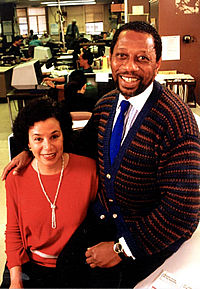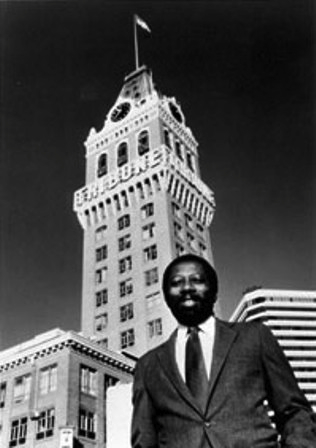Bob Maynard of the Oakland Tribune
By Dori Maynard Maynard Institute for Journalism Education
In 1977, my father quit his job on the Washington Post to begin working on the institute that bears his name today. That following summer he and my mother went out to the Bay Area where she was running his summer program for minority journalists. And he began his day running around Lake Merrit looking up at the Oakland Tribune and thinking, "I want that paper."
When they returned to Washington, DC that September, their old friend John Quinn called my father, told him that Gannett was thinking about buying the Oakland Tribune and asked my father if he had any recommendations for potential editors. He did. He had one -- himself.

But he had a plan to change that and shortly after he was named editor, his then-publisher of the paper became so tired of my father's frequent requests for this or that that he finally threw up his hands and facetiously told him "you seem to know what you need, just take care of it."
So the next day my father called in a construction crew. And they tore down some walls and he built a new conference room.
Four years later he became the first African American to own a major metropolitan daily. And throughout his tenure with the Oakland Tribune he put together one of the most diverse newsrooms in this country.
Roy Aarons, who later went on to become the founder of the National Lesbian and Gay Journalists Association, was the executive editor. Eric Newton, who went on to create the contents of the museum, was the managing editor. And the late Charles Jackson, who in 1990 produced a package on racial profiling, was the city editor.
And in that conference room they conceived of coverage that cut across the five fault lines of race, class, gender, generation and geography, winning hundreds of awards including the Pulitzer Prize.
So when I think about the lessons my father left, I think about vision, boldness and a commitment to excellence. Those lessons are particularly important to us in the industry this year as we are faced with dwindling resources and a newsroom census that looks very little like the nation's census. In fact the two are going in opposite directions.

As we move forward I know my father would say that if this industry is to survive and thrive this is the very time that we need a vision for the newsroom of the future and the boldness to finally make it so if we are to ever deliver on our promise of excellent, accurate, and credible journalism. For without diversity, we cannot have excellent, accurate, or credible journalism.
Nine months before he died, the economic realities of another recession forced my father to sell the paper. That could, to some, look like a failure. But nine years earlier there had been no other bidders for the Oakland Tribune. And indeed, during my father's association with that paper, people regularly predicted that Oakland was going to become the first major metropolitan city to have no daily newspaper.
Today Oakland has a newspaper. And I believe that that is in large part a result of my father's vision of a diverse newsroom that produced a paper that looked at the five fault lines of race, class, gender, generation and geography and so reflected its city's vision of itself.
In those murky months before my father died, he promised the Freedom Forum that he would address a gathering of the Chips Quinn Scholars. As the time drew near it was clear that he was too ill to travel. But my father was determined to fulfill his promise. So he arranged to speak by speakerphone. In what was to be his last public address he said, "This country cannot be the country we want it to be if its story is told by only one group of citizens. Our goal is to give all Americans front door access to the truth."
Today, I hope that all of us will commit to making my father's goal a reality. So that together we can work to ensure that this industry survives and thrives. And if there is a leadership moment from my father's life that I think we need to mirror right now, it is that determination to do what it takes to fulfill a promise.
Thank you very much
This was a "leadership moment" presented at the ASNE Convention April 3, 2001, at the J.W. Marriott Hotel in Washington, D.C.
